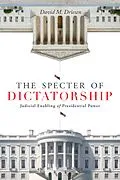Reveals how the U.S. Supreme Court's presidentialism threatens our democracy and what to do about it.
Donald Trump's presidency made many Americans wonder whether our system of checks and balances would prove robust enough to withstand an onslaught from a despotic chief executive. In The Specter of Dictatorship, David Driesen analyzes the chief executive's role in the democratic decline of Hungary, Poland, and Turkey and argues that an insufficiently constrained presidency is one of the most important systemic threats to democracy. Driesen urges the U.S. to learn from the mistakes of these failing democracies. Their experiences suggest, Driesen shows, that the Court must eschew its reliance on and expansion of the "unitary executive theory" recently endorsed by the Court and apply a less deferential approach to presidential authority, invoked to protect national security and combat emergencies, than it has in recent years. Ultimately, Driesen argues that concern about loss of democracy should play a major role in the Court's jurisprudence, because loss of democracy can prove irreversible. As autocracy spreads throughout the world, maintaining our democracy has become an urgent matter.
Autorentext
David M. Driesen is University Professor in the College of Law at Syracuse University. He is the author of The Economic Dynamics of Law (2012).
Inhalt
This chapter explains that this book will analyze excessive presidential power's potential to undermine democracy by exploring democratic decline primarily in Hungary, Turkey, and Poland. It outlines the book's major lesson: the head of state plays a key role in establishing autocracy by establishing unimpeded control over the executive branch in keeping with the American unitary executive theory, often accelerated through use of emergency powers. It outlines the book's argument that the U.S. Supreme Court has augmented executive power in dangerous ways and describes its principal recommendations for taking the potential for autocracy into account in adjudicating separation-of-powers cases. It summarizes each chapter's contribution to this argument.
This chapter establishes that the Founders of this nation shared a goal of avoiding a future drive to autocracy and suggests that this intention should guide the Supreme Court's treatment of presidential power. It explains the controversy over whether the Founders embraced the unitary executive theory and shows that they did not expressly grant emergency powers to the President in the Constitution. It introduces the concept of original intent and explains that it increasingly influences judges and constitutional scholarship, making this chapter's treatment of the creation of the Constitution important to establishing room to take lessons from democracy loss abroad into account in adjudication of separation of powers disputes.
This chapter provides an account of the rise of presidential power from the Founding through the late twentieth century. It explores the historical roots of the fear that presidential control over the executive branch of government and the growth of presidential emergency powers would undermine democracy and the rule of law. It canvasses the controversies (judicial and political) over presidential removal of federal officials from office (which the unitary executive theory insists must be free from restriction), from Andrew Jackson's effort to circumvent legislation creating the National Bank to Richard Nixon's attempt to thwart investigation of crimes undertaken to tilt the electoral playing field. It explains how congressional delegation of authority has enhanced the President's power over time. It also shows that the Supreme Court imposed constraints on emergency powers throughout this period, recognizing this presidential power as dangerous to democracy.
This chapter explains that the courts have augmented presidential power by frequently refusing to adjudicate claims that the President has exceeded his constitutional authority. It explains the key justiciability doctrines that the courts have used to shield Presidents from allegations of misconductstanding, ripeness, and the political question doctrine. It establishes that the courts have applied these doctrines quite strictly, and sometimes grossly distorted them, to shield allegations of presidential usurpation of power from judicial scrutiny. At the same time, it has been quite liberal in entertaining challenges to congressional efforts to check and balance the executive branch. It shows that the courts' refusal to entertain challenges to unilateral presidential wars has aided the transfer of the war power from Congress to the President.
This chapter explains that the modern Supreme Court has generously granted the President extensive implied powers at the expense of Congress, while declining to apply the implied-powers doctrine to sustain efforts by Congress to check the executive branch. It shows that the Court's implied-powers jurisprudence has not only expanded the President's foreign affairs power, but also eroded checks and balances domestically. It emphasizes the role of the unitary executive theory and the legislative veto in undermining checks on emergency...
